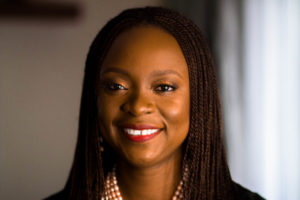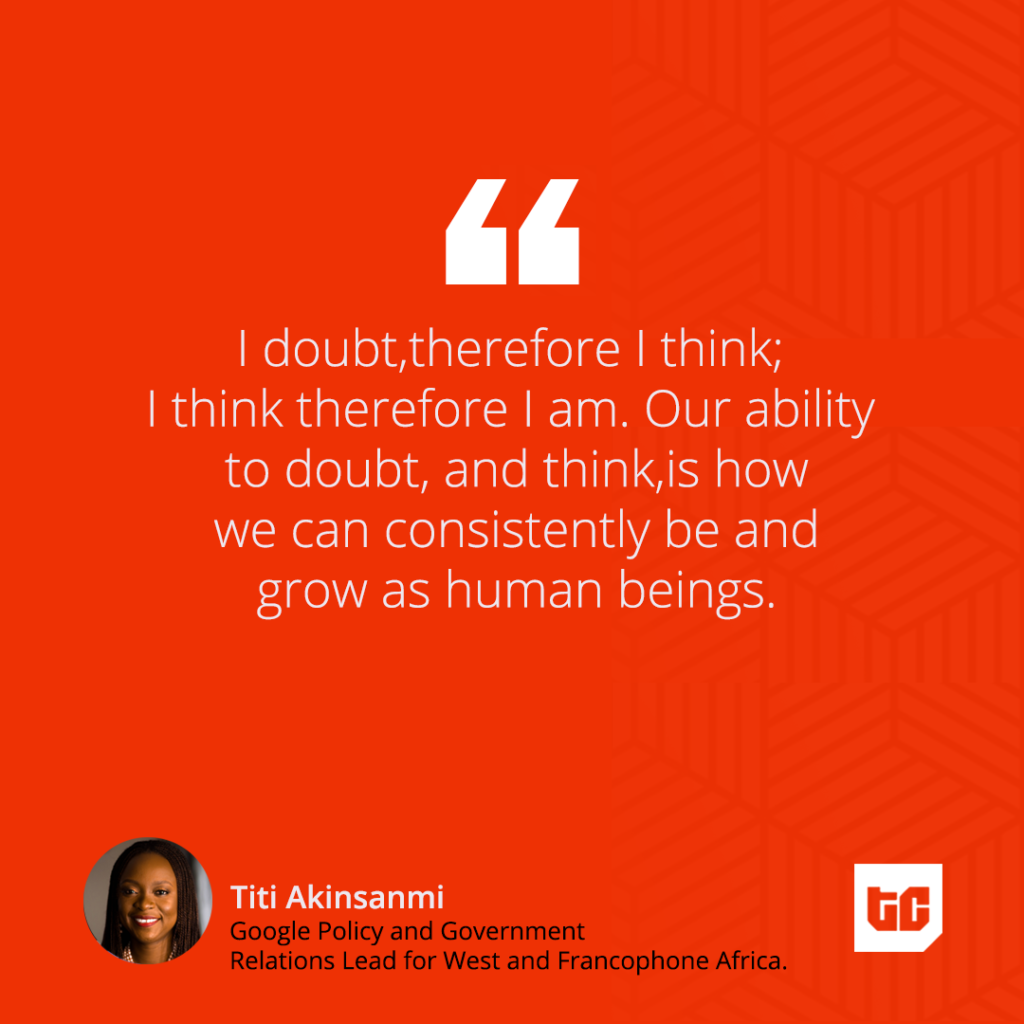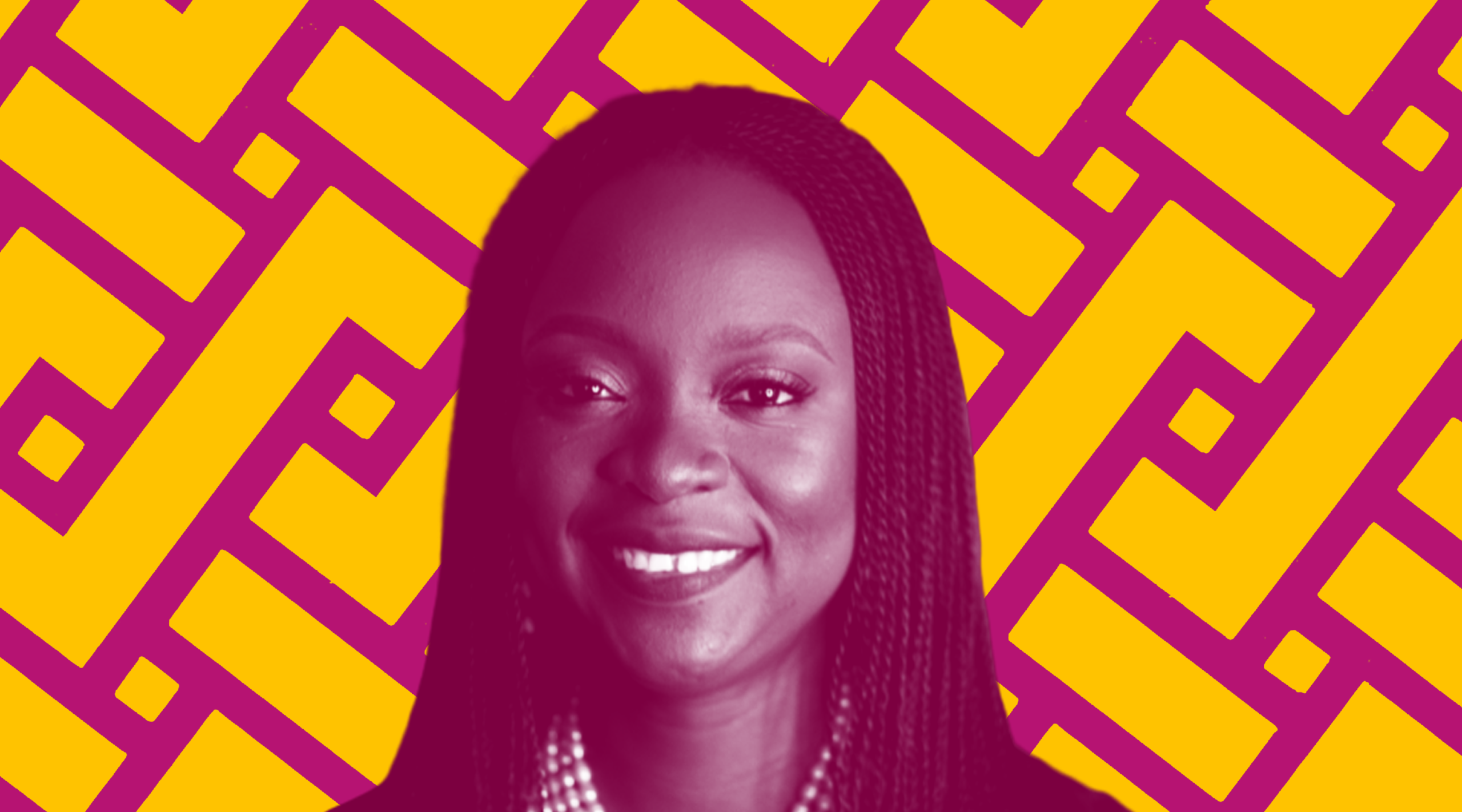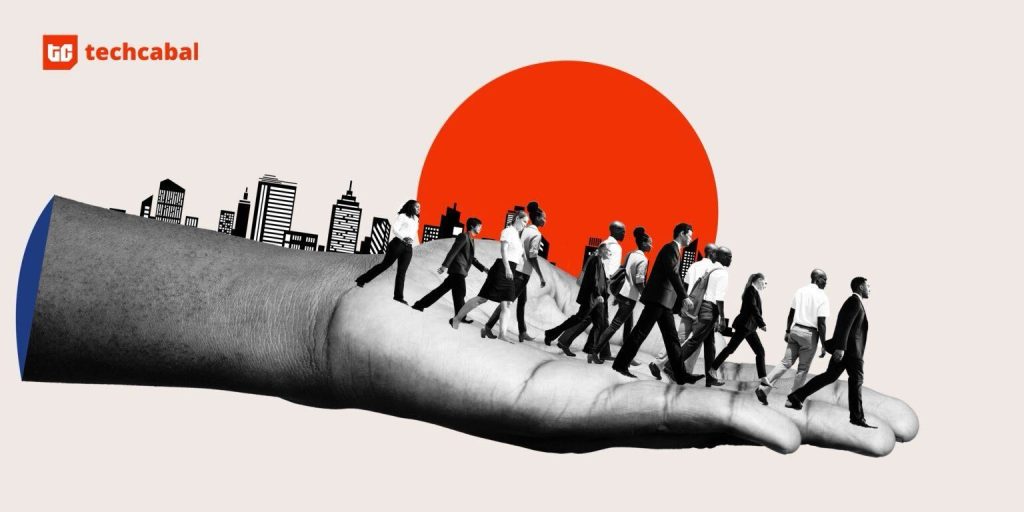Google’s Policy and Government Relations Lead (West/Francophone Africa), Titi Akinsanmi’s life and career, an intricately intertwined unit, are built on three pillars: a four-word mandate, a Latin mantra and actionable faith. On the evening we meet, she is preparing to attend Google’s end of year Christmas party in Lagos having been in the country a week prior. When people come into the country, they hang out, she says jokingly, but “I am attending a Google Christmas party”.
“My friends are my colleagues, my colleagues are my friends.”
Our conversation eases into itself. Akinsanmi is telling me about her newfound interest in being talked about in the media and her wariness about divulging her personal life to the public. Why she agrees to speak to me, however, must be in line with a responsibility to share bits and pieces of her career journey for the benefit of a younger woman or girl who, like she was over two decades ago, may be in need of a female figure to aspire to.
Despite having chosen a career path that now requires constant interfacing and interacting with other humans, Akinsanmi tells me she is shy, still gets jittery ahead of public speaking engagements and sometimes contends with “what we now call Imposter Syndrome”. But she compliments these curves with a palpable sense of self-worth and respectability that when she says “…absolutely think that Titi is brilliant” in response to how people perceive her after meeting her for the first time, there is no iota of doubt about that.
Inspire.
Akinsanmi’s career spans a 19-year period in the technology sector beginning sometime in the late 1990s.
“I came into technology because someone abused me,” Akinsanmi tells me.
In her final year of university at the Obafemi Awolowo University in Ife, a classmate had just bought a new computer and in youthful excitement, while examining the new device, the young man had brushed her off saying she probably did not know how to use it. That stung. But also lit the fire that has burned for nearly two decades. It was the dawning of a new century, the age of technology. It wasn’t that she had no inkling of how computers worked but having majored in English in her undergraduate studies, her interaction with technology and computers hadn’t been consistent. So, during one of ASUU’s incessant strikes, she took to making chin chin, selling them to a staff community around which she grew as a teacher’s daughter and raising funds to pay for lessons in the basic computer appreciation as well as computer languages in Alagomeji, Yaba.
Armed with both knowledge and zeal, it wasn’t long before she would meet late Professor Gabriel Olalere Ajayi who was the pioneer Director General of the National Information Technology Development Agency (NITDA). Akinsanmi and a group of friends, including ‘Gbenga Sesan, now the Executive Director of Paradigm Initiative, with funding and support from NITDA embarked on a nationwide computer training programme.
“The one place that really sticks to mind for me is Zaura Baba community in Kano, and getting into the village, training the kids both girls and boys, and seeing their eyes light up,” she recalls, a validation of the impact of the work that she was doing.
To further this work, another initiative, Afara, which sought to shore up content production in Yoruba to inform what this new crop of technology adopters were interacting with, followed.
“Afara, literally means the bridge, the bridge between my real life and the technology world,” she says.
Paradigm Initiative had also begun taking shape at this time and Sesan ran with it. But there was a huge gap still with all the technology adoption and knowledge acquisition that she was spearheading or involved in at the time. Government policies, regulation and stance on technology were unclear, completely lacking and anything but progressive.

“I think that’s where I found my perfect space,” she says.
Involve.
Prior to this time, after serving as a news broadcaster in National Youth Service camp in Nonwa Gbai Tai, a local government in Rivers state, Akinsanmi ventured in media working as a reporter and sports presenter for Superscreen Television before she got offered a role at Mtech Communications PLC, a mobile content company that was founded by Chika Nwobi in 2000.
“I recall the person who was my producer at Superscreen telling me; you have two paths in front of you. You can decide to go into television, you’d be very great at it but this technology thing, I don’t really know whether it’s going anywhere but think really hard about it.”
Unsurprisingly, Akinsanmi had no iota of doubt that she would have excelled in either field. But she chose technology.
“I chose to sit quietly behind the desk with some engineers and be the one that ensured that the first VAS news platform that we had in Nigeria was working and had content every single day. That was my job.”
But on the side, Akinsanmi continued with her advocacy and activism work for the sector, volunteering to continue interfacing with government/regulatory institutions and driving technical knowledge acquisition and fostering the spread of the benefits of the digital economy.
“I would forever be grateful to Mrs. Sherri Williams and Chika [Nwobi] for giving me the opportunity to be able to do what I did.”
She had wanted some time off work to attend a Youth Employment Summit in Egypt to continue her volunteer work in advocacy. This was in 2002 and led to a job opportunity in South Africa which she took up and lost 6 months after.
“They wanted somebody else. I didn’t fit the perception that they had of the work I was doing.”
They had expected “a big African woman” when she walked into the room during a brainstorming session, a young, petite, black woman whose work had clearly gone ahead of her to warrant being invited into the room. As soon as word got out that her contract had been terminated, Akinsanmi says she was inundated with offers from organisations who had heard of and respected her work ethic.
That period was demoralizing. But it passed and a few years later, she was working as a project manager for a Dutch organisation with operations across Africa, Asia, Europe and North America where she continued to develop strategy around technology education and community building. She was only 22 and spent the next six years navigating the tough racial landscape of post-apartheid South Africa.
“The one way you can get me broken, and I have been broken, is when you question my work ethic or my ability to be able to willingly share,” she adds.

Akinsanmi has since worked with global organisations like the World Bank Institute, the United Nations’ Global Alliance for Information and Communication Technologies and Development and the Economic Commission for Africa (UNECA) and more recently, Google where she continues to work along the lines of education, growing the digital economy and influencing digital policy development.
Impact.
Akinsanmi’s idea of impact is fluid, a sum of many little actions and moments of interacting and planting viable seeds in people, from her dress maker to girls, women and men from across the globe whom she’s had a chance to speak to or be involved with including Nigeria’s film industry.
“I love the arts, I love the theatre!”
For the last 8-10 years, Akinsanmi has been bridging the gap between budding and established screenwriters, producers and filmmakers to produce films that speak to technology and how it is impacting our lives today: issues around cyber criminality, copyright issues, intellectual property, internet safety especially for underaged users.
“Increasingly, I did a lot of partnerships with a group called Homevida based out of Abuja and the 10th edition happened this past Tuesday.
“It’s about being able to take Nollywood and let it speak to real world issues in a concrete way so that it gets into the consciousness of people,” she explains.
While Akinsanmi continues to shuttle around the globe, her family remains one of the critical stabilisers in her life. Her husband, a soft-spoken man, accompanied her when we met and came in and out during the hour we spent conversing to check in on her as she got ready for the Christmas party. They both met face-to-face in 2005 in South Africa having been introduced on Yahoo Messenger by a mutual friend. They had interestingly been in the same circles since ‘96 as students in Ife and Ibadan. They’ve been married for 9years.
“The support system that I have is critical to excelling personally and career-wise and my husband is at the core of that. My children as well. My daughter says to me-mummy, I love that you work for Google. I wish you traveled less but I am very proud of you.”
Despite her constant traveling (think six countries and three continents in four weeks), Akinsanmi says she ensured her daughters, aged seven and four, were with her in the first two years of their lives taking off and landing wherever the job took her.
“My motherhood is a nondivisible part of my ability to succeed and thrive in my career and in everything else,” she stresses. Now she actively provides similar support and creates safe spaces for women (and men) to do the same.
Inform.
Akinsanmi is an avid reader, and education and information remain the bedrock of her work in the sector and this takes on a number of forms including intensive digital training drives (the Andela Learning Circles, the painstaking work of policy advocacy including hosting private policy intervention conversations and the ability to provide and convince someone on the other side of the table with enough information to rethink their stance on a certain topic or area.
She remains quietly working on these areas especially around internet freedoms in Nigeria and across Africa, police harassment in the sector among others.
“This social media bill has shown up in different veins over time.”
Across Africa, internet shutdowns and new digital taxation policies seem to spell doom for a continent still attempting to catch up with the rest of the world technology-wise. Still, Akinsanmi believes that we are living in much better times historically.
“At least they are aware there is a digital economy now and there is a need to connect with it,” she explains.
So while the policies and regulations are not entirely progressive or fruitful, there is need to remain hopeful and double efforts in implementing already existing regulations, an area that is sorely lacking.

Is she at the summit yet? She can’t see it. Akinsanmi believes in something she calls the multiplicity of paths and the idea that there is not one place an individual is destined to arrive at so there are more areas she hopes to pursue in time, including being a jazz lounge singer.
“There’s a hunger inside of me and that hunger is not detrimental. That hunger is to be able to consistently inspire, inform, involve, impact even if all I’m doing, sincerely, is bringing up my four and my seven-year-old.”




















